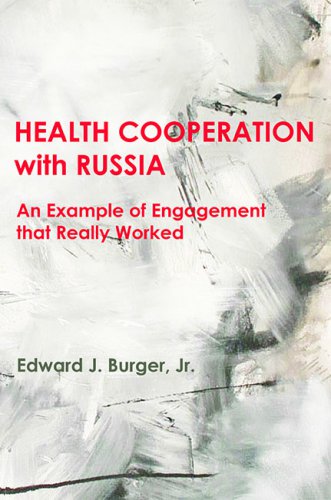
About the Author
Edward Burger is Director of the Eurasian Medical Education Program and President of the Institute for Health Policy Analysis. He served in the White House Office of the President’s Science Advisor during the early 1970’s and helped develop cooperative programs in science, medicine and the environment with the Soviet Union during the period of detente. He served as leader of U.S. delegations to the Organization for Economic Cooperation and Development and served as Senior Scientific Advisor to the Economic Commission for Europe of the United Nations. He was Professor of Community and Family Medicine at the Georgetown University Medical Center. Dr. Burger is the author of nearly 100 professional articles as well as several book-length works.
HEALTH COOPERATION with RUSSIA: An Example of Engagement that Really Worked
Edward J. Burger, Jr.New Academia Publishing, 2017
92 Pages, 11 Illustrations
ISBN 978-0-9986433-3-5 Paperback
For BULK ORDERS, order directly from New Academia Publishing.
Queries: orders@newacademia.com
About the Author
Edward Burger is Director of the Eurasian Medical Education Program and President of the Institute for Health Policy Analysis. He served in the White House Office of the President’s Science Advisor during the early 1970’s and helped develop cooperative programs in science, medicine and the environment with the Soviet Union during the period of detente. He served as leader of U.S. delegations to the Organization for Economic Cooperation and Development and served as Senior Scientific Advisor to the Economic Commission for Europe of the United Nations. He was Professor of Community and Family Medicine at the Georgetown University Medical Center. Dr. Burger is the author of nearly 100 professional articles as well as several book-length works.
About the book
Shortly following the fall of the Soviet Union, The Eurasian Medical Education Program of the American College of Physicians was established to make a contribution to the health challenge in Russia following seventy years of relative isolation of the Russian medical profession from Western medicine. Over the next 17 years, the program brought American physician experts to share medical scientific knowledge and contemporary standards of care with Russian practitioners. The program ultimately interacted with over 10,000 Russian physicians in 13 Russian regional academic medical centers across most of the eleven time zones of Russia. The 17-year period of the program was notable for nearly constant political and economic turmoil in Russia and very volatile US-Russian relations. Against this environment, the Eurasian Medical Education Program not only performed unperturbed but with professional enthusiasm from the Russian medical establishment and leadership, proving again that health and medicine are outstanding instruments of engagement politically.
Praise
“Edward Burger can add genuine value to our understanding of US-Russian interaction during the 1990s… As one of the founders of these projects and as an organizer throughout, he knows this story better than anyone. A work setting this knowledge down would be an important addition to the historical record.”
―Blair Ruble, Vice President for Programs, Woodrow Wilson Center
“I found it thoroughly enjoyable to read and it adds an important concept to the existing literature on health and foreign policy. Its message is an important one –using health as a way of working together for a common good, regardless of ideology.”
―Donna E. Sweet, MD, AAHIVS, MACP; Professor of Medicine, The University of Kansas





 Coming Soon
Coming Soon Awards
Awards